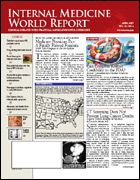Publication
Article
Internal Medicine World Report
Vitamin A May Help Keep Gastric Cancer at Bay
Author(s):
Am J Clin Nutr
N ew evidence suggests that people who eat a lot of liver and carrots, both of which contain high levels of vitamin A, may be at lower risk of gastric cancer (. 2007;85: 497-503).
The 7-year, prospective, population-based study was conducted to determine if there was an association between intakes of preformed vitamin A (retinol) and specific provitamin A carotenoids (ie, α-carotene, β-carotene, and β-cryptoxanthin) and risk of gastric cancer. Retinol is found in foods of animal origin (ie, liver, kidney, dairy products, and eggs), whereas carotenoids are found in fruits and vegetables.
It is thought that vitamin A may influence the development of gastric cancer by controlling cell proliferation; however, previous studies have produced inconsistent results.
Investigators examined the records of 82,002 Swedish men and women (aged 45-83 years) who had completed a 96-item food-frequency questionnaire in 1997 that asked how often they ate various foods or took multivitamins. Total vitamin A and retinol intakes were estimated by combining dietary and supplement intake, and patients were divided into quartiles based on their intake.
During the 7 years of follow-up, 139 cases of gastric cancer were diagnosed. Analysis showed that persons with greater intake of vitamin A and retinol from foods only (dietary intake), from foods and supplements combined (total intake), and from dietary α-carotene and β-carotene were at lower risk for gastric cancer.
Compared with individuals in the lowest quartile of total daily vitamin A intake (890 μg retinal equivalents [RE]) and in the lowest quartile of total daily retinol intake (527 μg), persons in the highest quartile of vitamin A (2474 μg RE) and of retinol (1780 μg) intakes had a 50% lower risk of gastric cancer. No significant association was found between β-cryptoxanthin, lutein and zeaxanthin, or lycopene intake and gastric cancer.
Liver and carrots were the leading sources of vitamin A in the study participants. Those who reported consuming liver (about 2 servings monthly) or carrots (about 3 servings weekly) had a significantly lower risk of gastric cancer compared with those who never ate liver or carrots.
Smoking was associated with the protective effect of vitamin A, although the mechanism by which smoking may interact with vitamin A is not yet known. The inverse association between gastric cancer and vitamin A intake applied only to never and former smokers, not to current smokers.
“Findings from this prospective study suggest that high intakes of vitamin A, retinol, and the provitamin A carotenoids…may reduce the risk of gastric cancer,” the authors conclude. “These results support the hypothesis of a possible protective role of vitamin A in gastric carcinogenesis.”






